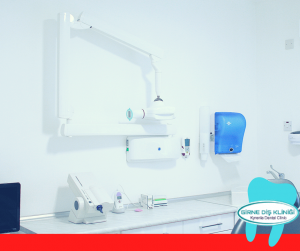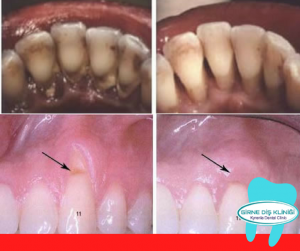 At Kyrenia Dental Clinic in North Cyprus, we take the time to educate our patients on the severity of gum disease. Gum disease is a progressive condition that affects more than 64 million adults each year, according to the American Academy of Periodontology.
At Kyrenia Dental Clinic in North Cyprus, we take the time to educate our patients on the severity of gum disease. Gum disease is a progressive condition that affects more than 64 million adults each year, according to the American Academy of Periodontology.
Not only is gum disease destructive to the aesthetics of the smile, but if left untreated, periodontal disease can have serious health consequences, including increased oral pain, bone loss and loss of teeth. Studies have also shown a relationship between untreated periodontal disease and health conditions affecting other parts of the body, including heart disease, certain types of cancer and stroke.
When discovered and treated in its earliest stage — it can be cured. Even in the later stages of gum disease called periodontitis, management is possible with routine periodontal maintenance treatments.
These maintenance treatments require visits to our highly trained North Cyprus dentist, Dr. Mustafa Haldun Sevgili every three months to prevent symptoms like periodontal pockets and bleeding gums from recurring.
Healthy Gums
If you have healthy gums, they will look firm and pink. Some signs of unhealthy gums include redness and swelling, gums that bleed when you brush or floss your teeth, and gums that appear to be pulling away from the teeth.
There are several factors that can undermine healthy gums, including tobacco use, malnutrition, poor oral hygiene, and poor immunity due to more severe medical problems. Also, certain medications, including some types of antihistamines, decongestants, and painkillers, can cause dry mouth, which can promote gum disease.
When you have healthy gums, your teeth are well-supported by the tissue in your gums and your chances for long-term oral health are significantly increased. If you don’t maintain healthy gums, you are more likely to have gum disease, which can progress to many problems with your teeth and other long-term, chronic health conditions can be associated with periodontitis, a serious form of gum disease.
Indications of Gum Disease
 Gum disease is often unnoticed, meaning symptoms may not appear until an advanced stage of the disease.
Gum disease is often unnoticed, meaning symptoms may not appear until an advanced stage of the disease.
The main cause of gum disease is a sticky transparent layer that is firmly attached to the tooth called a bacteria plaque. Between 200 and 500 million bacteria are found on a milligram of plaque.
The warning signs of gum disease also include the following:
- Red, swollen or tender gums or other pain in your mouth
- Bleeding while brushing, flossing, or eating hard food
- Gums that are receding or pulling away from the teeth, causing the teeth to look longer than before
- Loose or separating teeth
- Pus between your gums and teeth
- Sores in your mouth
- Persistent bad breath
- A change in the way your teeth fit together when you bite
- A change in the fit of partial dentures
What is Periodontal Disease?
Periodontal disease has three stages — gingivitis, periodontitis and advanced periodontitis. Gingivitis is the only stage that can be potentially reversed if proper care is received quickly. The more advanced stages of periodontal disease cannot be reversed, but symptoms can be controlled and managed with treatments from our expert cosmetic dentist in North Cyprus.
Here at Kyrenia Dental Clinic, Dr. Mustafa Haldun Sevgili offers a variety of periodontal care services for those with periodontal disease, including scaling and root planing, flap surgery and periodontal maintenance.
- Root scaling and planing. Removal of the plaque and tartar on your teeth above and below the gum line.
- Gingivectomy. Removal of diseased gum tissue, and elimination of any pockets between the teeth and gums where bacteria can easily grow.
- Extraction. Removal of loose teeth, or removal of teeth that are badly decayed or damaged.
- Flap surgery. Cleaning the teeth roots and repairing any bone damage.
Do your gums bleed while you are brushing? Is there redness and swelling? This inflammation of the gums is the body’s response to certain bacteria that have been allowed to accumulate on the teeth. The inflammation can spread down below the gums and along the roots of the teeth, causing destruction of the periodontal ligament and the supporting bone. This ultimately leads to the loosening and potential loss of the teeth.
Periodontal Disease Treatment
The key to success is to eliminate the bacterial plaque which is triggering the disease process and to establish excellent oral hygiene practices.
- Oral Hygiene
The aim of the oral hygiene phase of treatment is to reduce the number of bacteria in the mouth — further reducing the level of inflammation. Upon your visit, we will first explain the causes of your periodontitis and discuss the best treatment plan. You will be given individual advice on how to use the various cleaning aids most effectively, including the most appropriate tooth brushing technique and the correct use of dental floss and brushes.
- Professional Cleaning
All soft deposits will be removed from accessible areas of the teeth and the teeth polished and treated with fluoride. Depending on the improvement seen in plaque control and gum health, further instruction and cleaning may be carried out in subsequent visits. The next step is to remove all bacterial deposits and tartar from the root surfaces and pockets.
- Antibiotic Therapy
In some cases, with or without microbiological evaluation, antibiotics are prescribed to deal with active or persistent gum infections, which have not responded to oral hygiene measures.
- Reassessment
After several weeks, Dr. Sevgili will make a full assessment of your gums to check the progress of your treatment. A special instrument called a periodontal probe is used to record the depth of any periodontal pockets and check for bleeding from the gums. If periodontal pockets are still present, further treatment options may be suggested, including surgical corrective therapy.
- Surgery
Sometimes, a surgical procedure is carried out to clean away plaque bacteria and deposits that are under the gum within periodontal pockets and on the root surfaces where the roots diverge. These areas are inaccessible to brushes and floss and inflammation will persist in these sites as long as bacteria are allowed to colonize them. Under local anesthesia, the gum is lifted away and the root surfaces are cleaned under direct vision to ensure that all bacteria are removed. Sometimes, it is possible to treat bone loss at the same time using a special regenerative treatment. At the end of the procedure, the gums are sutured back into place around the teeth.
- Aftercare
The long-term success of periodontal treatment depends both on your own efforts with oral hygiene and those of the practice team who provide your regular care and ongoing assessment. After the first phase of treatment has been completed, our dental team will need to review the condition of your gums at regular intervals to check that the inflammation has been halted. The frequency of your follow-up appointments will depend on the severity of disease and your individual risk of disease progression.
Here at Kyrenia Dental Clinic, we strive to offer each patient customized treatment to help them achieve proper oral health. Contact us today to set up your free phone or virtual consultation.

 TUR
TUR


